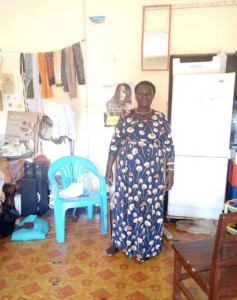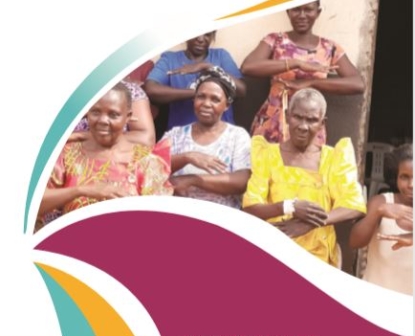Project
Influencing change for women voices and rights
-
Amount Funded
157,998 EUROProject Duration
01 Dec 2018 - 31 May 2020 -
-
Lead organisation
Gulu Women Economic Development and Globalization
-
Gulu Women Economic Development & Globalization (GWED-G) is a women rights organisation implementing long term sustainable development programmes in line with women rights empowerment and advocacy, peacebuilding, health, activities, for youths and young people, economic and social empowerment, research and advocacy. The last 14 years the Organisation has grown to be recognised as a leader in human rights and governance in the region, nationally and globally. GWED-G exists to empower women and girls by providing effective institutional and technical capacity, building a strong community-based model for women empowerment, strong strategic and operational partnerships, knowledge management and resource mobilisation. In the last 3 years, GWED-G has implemented land rights advocacy programmes for vulnerable individuals and groups in the post conflict Acholi region. GWED-G continues to contribute to strengthening legitimate and responsible civil society organisations.
-
Organisation
Gulu Women Economic Development & Globalization (GWED-G) is a women rights organisation implementing long term sustainable development programmes in line with women rights empowerment and advocacy, peacebuilding, health, activities, for youths and young people, economic and social empowerment, research and advocacy. The last 14 years the Organisation has grown to be recognised as a leader in human rights and governance in the region, nationally and globally. GWED-G exists to empower women and girls by providing effective institutional and technical capacity, building a strong community-based model for women empowerment, strong strategic and operational partnerships, knowledge management and resource mobilisation. In the last 3 years, GWED-G has implemented land rights advocacy programmes for vulnerable individuals and groups in the post conflict Acholi region. GWED-G continues to contribute to strengthening legitimate and responsible civil society organisations.
-
Project
Influencing change for women voices and rights strengthens women’s leadership and participation in decision-making processes and platforms at local, regional and national levels while enhancing women’s agency and contribute to their full enjoyment of their own fundamental human rights. According to records from 10 selected sub-counties in Gulu, Omoro and Nwoya districts, participation of women in development planning and other public spaces was estimated at 43% only. This means that the district development plans do not reflect and take care of women’s development priorities. This gap is exacerbated by quality and effectiveness of representation of women’s voices in councils at district and sub-county levels. From the records of Gulu and Amuru district Clerks to Council, women councilors’ participation is rated at less than 33% for Gulu and 28% for Amuru districts respectively. This implies that women councilors have limited capacity to effectively engage issues of development, influence outcomes of debates to improve the social and economic circumstances of women and other vulnerable groups. The project influences women leaders at sub-county, district and national level to advocate for allocation of resources/funds to critical women needs and sectors like maternal health, water and education. Overally, the project seeks to improve gender sensitive plans and budget allocations at the district and sub-county levels.
-
-
Influencing change for women voices and rights strengthens women’s leadership and participation in decision-making processes and platforms at local, regional and national levels while enhancing women’s agency and contribute to their full enjoyment of their own fundamental human rights. According to records from 10 selected sub-counties in Gulu, Omoro and Nwoya districts, participation of women in development planning and other public spaces was estimated at 43% only. This means that the district development plans do not reflect and take care of women’s development priorities. This gap is exacerbated by quality and effectiveness of representation of women’s voices in councils at district and sub-county levels. From the records of Gulu and Amuru district Clerks to Council, women councilors’ participation is rated at less than 33% for Gulu and 28% for Amuru districts respectively. This implies that women councilors have limited capacity to effectively engage issues of development, influence outcomes of debates to improve the social and economic circumstances of women and other vulnerable groups. The project influences women leaders at sub-county, district and national level to advocate for allocation of resources/funds to critical women needs and sectors like maternal health, water and education. Overally, the project seeks to improve gender sensitive plans and budget allocations at the district and sub-county levels.
-
There is always time for everything, with focus and persistence
The lives of women and girls were impacted the most by the conflict in Northern Uganda. They faced serious human rights violations and abuse and were targets of sexual and gender based violence (SGBV), lived through chronic poverty and suffered limited access to education. Formerly abducted women and girls, adolescent girls, female headed households and women in general are isolated, stigmatized and are often excluded from development activities and personal growth opportunities. The urgent need to mitigate this past is calls for an increase in women’s agency through social empowerment, promotion of civic empowerment and political participation (leadership and governance) for women and youth, and the promotion of zero tolerance to SGBV
Gulu Women Economic Development and Globalization (GWED-G) specifically set up, Influencing change for women voices and rights in Acholi Region project for this purpose. It envisioned enhanced enjoyment of human rights by women and girls by improving the gender sensitive balance to influence decisions of councils on special needs of women in local development discourse. This is to include access to economic resources, opportunity for increased access to markets and financial resources, respect of women’s human rights and assurance of a life free from SGBV. The project worked with community structures like model men, Rapid Action teams (RATs), locally based human rights volunteers, and women groups to stimulate demands on women leadership. Aber Hellen Uma and Achola Concy share their experience on the impact GWED-G has had on their lives and communities
The Community Choice
Aber Hellen Uma, a female Ugandan aged 64 years, is a teacher and a resident of Coopil Village, Angaya Parish, Unyama Sub county, Aswa County in Gulu district. She describes herself as,
“a woman Councillor V caretaking Unyama and Paicho under the ticket of the older persons. I am also a BoD member at Gulu College of Health Sciences.”

Hellen is a family woman married to Mr. Uma James and they have been blessed with 14 children (7 girls and 7boys) and 5 grandchildren. She is also a career woman having gone through mainstream education in Uganda. She was first employed as a Clerk Cashier by Christ the King Demonstration School and her duties included collecting money and paying salaries. In 1980, Aber enrolled as a teacher at Tegot Ato primary school and Coopil primary school where she actively taught for 6 years. She later stopped due to the Lord’s Resistance Army (LRA) War where everybody had to fend for their lives instead of progressing career wise. In 1986, the community nominated her in absentia for the position of executive member of Local Council (LC) where she served and later also served in the Executive Council II. She says “Still without my knowledge and consent, the community nominated me for Local Council III where I was to contest with Hon. Aol Betty Ocan. However, my husband refused to let me continue my moves of actively joining politics as he preferred that I take care of the 14 children instead of political leadership.”
In 2003, she was nominated by the community to join leadership under the Older citizen at the Parish level and in 2005 she was requested by the community to contest under the party structure and was nominated chairperson of Forum for Democratic Party but lost to her opponent although she was later elevated to vice chairperson. She later contested the councilor seat and luckily this time around since the children had now grown her husband was in agreement with her actively re-joining leadership. Because of her leadership role in the community, she got the opportunity to be part of GWED-G leadership trainings where she was invited as a participant. She is very grateful for GWED-G because her leadership skills and knowledge were strengthened especially the skill to ensure a work – life balance.
She narrates that, “I am sensitizing the community, especially parents that they are role-models to their children. I also talk to girls especially those in primary seven about the benefits of schooling. The teachers are also part of the package that receive my sensitization. With the teachers, I advise them to do child study if they are to understand children very well.”
BENEFITS OF “YALA YALA”

Concy, one of the beneficiaries. My name is Achola Concy. I hail from Lagwatek Village, Koro sub county, Omoro district. I am married and have one child.
I am a hair dresser and I operate a salon business.
I got to know about GWED-G when they visited my savings group in Koro in the month of August 2019. Since then I have followed closely the activities of GWED-G particularly mentorship and coaching. Through this, I acquired knowledge and skills on how to go about leadership at my local level. This has enabled me to contest for the position of chairperson in my Village Saving and Loan Association ( VSLA) group which I won with majority votes. Previously I was an ordinary and very timid member who would not say anything in the group even if it affected me. However, with the VOICE project, I have been empowered to speak up and rally behind fellow women. This has made me realize that women are actually more influential than men, meaning we have the power of numbers when it comes to voting and making decisions.
With the privileges of being a chairperson of a group, I have been in a position to attend other activities of GWED-G like the exchange visit that took place in Lapeta in Unyama Sub County. I was able to learn about “Yala Yala” activity which means saving for a particular purpose. I have introduced it in my group and its currently working very well. I decided to pilot it with 10 members to see how it would pick up. The 10 members each collect 33,000/= (Thirty Three Thousand shilling) meaning a total of 330,000/= (Three Hundred Thirty Thousand Shilling). This money is collected weekly and household items bought for a member. It has changed my life because ever since the members of “Yala Yala” collected money and handed it over to me, I was able to acquire gas for cooking. This saves a lot of time for me as I no longer take time lighting fire to prepare meals for my son on school days. The next time my turn to receive money comes round I plan to buy myself serving dishes. In the future I foresee myself buying iron sheets to put a roof over my small house since the roof of the hut is leaking.
-
News






